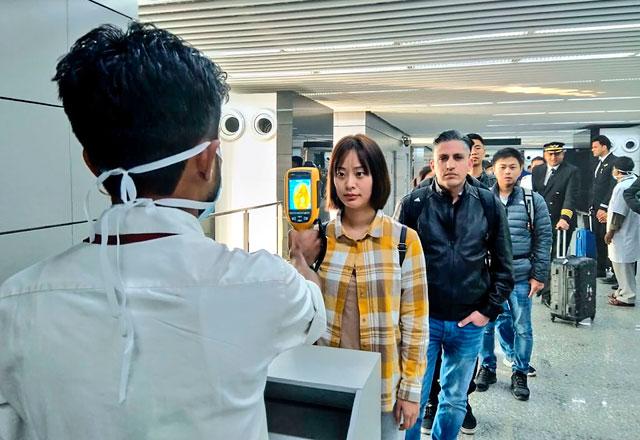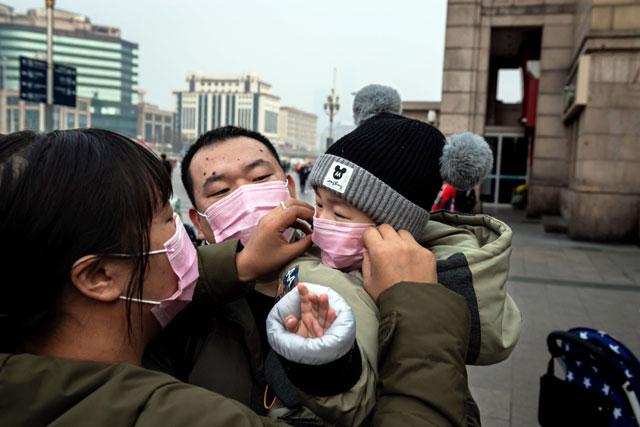You are here
Asia steps up checks as China virus kills six, infects nearly 300
By AFP - Jan 21,2020 - Last updated at Jan 21,2020

In this photo taken on Tuesday, a man (left) uses a thermographic camera to screen the head of people at Netaji Subhash Chandra Bose International Airport in Kolkata, following the ministry of health and family welfare’s advisory to screen passengers arriving in India from China and Hong Kong regarding the novel coronavirus issue (AFP photo)
BEIJING — Asian countries on Tuesday ramped up measures to block the spread of a new virus as the death toll in China rose to six and the number of cases jumped to almost 300, raising concerns in the middle of a major holiday travel rush.
Countries across the Asia-Pacific region stepped up checks of passengers at airports to detect the SARS-like coronavirus, which first emerged in the central Chinese city of Wuhan.
Fears of a bigger outbreak rose after a prominent expert from China’s national health commission confirmed late on Monday that the virus can be passed between people.
Authorities previously said there was no obvious evidence of person-to-person transmission and animals were suspected to be the source, as a seafood market where live animals were sold in Wuhan was identified as the centre of the outbreak.
But the World Health Organisation (WHO), which was concluding a fact-finding mission in Wuhan, was still being cautious, saying at a briefing in Geneva that “not enough is known to draw definitive conclusions about how it is transmitted”.
Spokesman Tarik Jasarevic warned though that “more cases should be expected” both in China and in other countries.
Hundreds of millions of people are criss-crossing China this week in packed buses, trains and planes to celebrate the Lunar New Year with relatives.
Almost 80 new cases have been confirmed, bringing the total number of people hit by the virus in China to 291, with the vast majority in Hubei, the province where Wuhan lies, according to the National Health Commission (NHC).
Other cases have also been confirmed in Beijing and Shanghai plus Guangdong, Zhejiang and Henan provinces.
Meanwhile, Wang Guangfa, one of the doctors on the NHC team investigating the epidemic, told Hong Kong TV station iCable News that he was receiving treatment after becoming infected.
The first case on the self-ruled island of Taiwan was also confirmed on Tuesday, with a woman taken to a hospital on arrival at the airport from Wuhan.
Wuhan Mayor Zhou Xianwang told state broadcaster CCTV on Tuesday that the death toll had risen from four to six.
China said it would attend a special WHO meeting on Wednesday which will determine whether to declare a rare global public health emergency over the disease, which was also detected in Thailand, Japan and South Korea among four people who had visited Wuhan.
The coronavirus has caused alarm because of its genetic similarities to Severe Acute Respiratory Syndrome (SARS), which killed nearly 650 people across mainland China and Hong Kong in 2002-2003.
Fever checks
At four airports in Thailand, authorities introduced mandatory thermal scans of passengers arriving from high-risk areas of China. Anyone exhibiting signs of fever will be quarantined for 24 hours for monitoring.
Around 1,300 passengers are expected each day in Thailand from Wuhan over Chinese New Year, which starts on Friday.
In Hong Kong, where memories of SARS still haunt the city, authorities said they were on “extreme high alert”, with passengers from Wuhan required to fill out health declarations and face possible jail time if they do not declare symptoms.
Enhanced screening measures have also been set up at airports in Australia, Bangladesh, Nepal, Singapore and the United States.
A man showing symptoms of the disease who had travelled to Wuhan has been put in isolation in Australia as health officials await test results, authorities said on Tuesday.
In China, the government announced it was classifying the outbreak in the same category as SARS, meaning compulsory isolation for those diagnosed with the disease and the potential to implement quarantine measures on travel.
In Wuhan, authorities banned tour groups and police were conducting spot checks for live poultry or wild animals in vehicles leaving and entering the city, state media said.
Passengers were being screened for fever at the airport, railway stations and bus terminals. Those with fevers would be registered, handed masks and advised to see a doctor.
Chinese train and plane authorities said travellers with tickets to Wuhan could get refunds.
WHO meeting
Zhong Nanshan, a renowned scientist at the national health commission, raised the alarm when he said on Monday that patients can contract the virus without having visited Wuhan, though he added that it was milder than SARS.
Doctors at the University of Hong Kong released a study on Tuesday estimating that there have been 1,343 cases of the new virus in Wuhan. Scientists at Imperial College in London said last week the number was likely closer to 1,700.
The WHO has only called a global public health emergency a handful of times, including during the H1N1 — or swine flu — pandemic of 2009 and the Ebola epidemic that devastated parts of West Africa from 2014 to 2016.
China was accused of covering up the SARS outbreak in 2003 but some foreign experts have praised the swift release of information on this new virus.
Related Articles
BEIJING — A new virus that has killed nine people, infected hundreds and reached the United States could mutate and spread, China warned on
WUHAN, China — China locked down some 20 million people at the epicentre of a deadly virus outbreak on Thursday, banning aircraft and t
WUHAN, China — China's capital on Monday recorded its first death from a deadly coronavirus as it struggles to contain a rapidly spreading d












